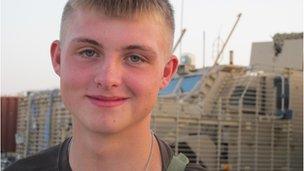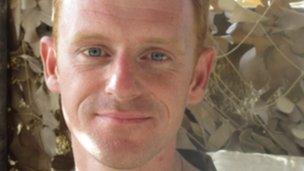Armed Forces Day: With the UK troops in Afghanistan
- Published
The BBC's Caroline Wyatt is with UK troops in Helmand on Armed Forces Day
As the UK marks Armed Forces Day with a parade in Plymouth and events across the country, almost 10,000 British forces are still serving in Helmand Province in Afghanistan.
The men and women of 12 Mechanised Brigade are now halfway through their tour.
It is morning and already sweltering in the bazaar in the town of Nad Ali, in central Helmand, with the temperature hitting the high 40s by midday.
On a rare British patrol through the town, Private Harry Turner is thronged by curious Afghan children, asking for pens and sweets.
He is pleased to be here, and keen to prove himself with his 1 Royal Anglian comrades.
He started training in September, two days after his 18th birthday, and initially did not expect to do a full six-month tour of Helmand.
"My mum was a little bit shocked, because she thought I'd only be out here for two weeks. But my mum and dad, and family are all supportive about me being here," he says.
"I was happy to stay out here. Obviously, you get the odd day where you just want to be home because you miss your bed and you're fed up of sleeping on rough beds, but I like it."
Crowded bazaar
He admits that serving in Helmand is hard work.

Private Harry Turner is only 18 but is enjoying his stint in Afghanistan
"But after you finish work, you can have a good laugh. I've left school and gone straight into a decent job. I know my life will be a little better because I've joined the Army, and I'm doing something," he adds.
British troops are now a rarity in the bazaar because Afghan security forces are now fully responsible for security there.
The place is crowded with men and children, and the stalls full of watermelon and tomatoes.
Some of the fertile fields here now yield more fruit and vegetables than opium, though in the deserts further north it is a different story.
A few years ago, when we walked through this same market, it was nearly empty, suspicious eyes tracking our every move.
It feels very different now. There are some hostile glances, but most are friendly and unafraid to approach.
Brigadier Doug Chalmers, the commander of Taskforce Helmand, served here in 2010, and says the changes he has seen are real.
"I've come back, and the town is now connected by blacktop road, and the market is bustling. The insurgency still exists. But it is further removed... there is much more confidence now. It's a huge change," he says.
British forces have been serving in Helmand for seven years, and they point to places like the market in Nad Ali as proof that their hard work and the many sacrifices made are finally bearing fruit.
When we talk to the shopkeepers, they now complain about the need for more solar-powered street lighting, rather than listing Taliban threats.
The need for education, rather than security, is top of their list.
Back at 1 Royal Anglians' forward operating base, Sergeant Simon Mercer is chatting to one of the Afghan soldiers he is advising.
He is on his fifth tour of Afghanistan, and he says he has been genuinely heartened by the changes he has seen.
"On my last tour, there were times you wouldn't have been able to get more than 500 metres or so out of the gate of some of the patrol bases without coming under fire. Now - within the canal zone - security has never been better here," he says.
'Trusted allies'
Sgt Mercer lives and works side by side with the Afghan Army, and says he trusts the company of Afghan soldiers he is with, despite the deaths of some British soldiers on this tour at the hands of their Afghan colleagues.

Sgt Mercer dashed back from Afghanistan when his wife went into labour
The Afghan Army way of doing things may be different, but he says they are able to operate on their own on significant operations and can resupply themselves.
"The Afghan soldiers I work with have gone from being a fledgling organisation to a really professional, well-gelled unit, and they're a pretty good bunch of people," he says.
"Nowadays, there are still pockets of fighting, but the vast majority of what we do is Afghan-led. We let them decide and design the operations and we follow up and give them the support they need.
"So instead of Isaf going out to take the fight to the enemy, it's the ANA (Afghan National Army) and Afghan police giving the security, and that's a huge change. We still provide medical help in the case of big incidents, but slowly they're taking over it by themselves," he adds.
The biggest challenge for Sgt Mercer on this tour was not bombs or bullets, but getting home when his wife went into labour nine weeks early.
The RAF flew him from his base in Nad Ali to the hospital ward in Salisbury, Wiltshire, in just 14 hours, by helicopter and several flights.
It is an achievement for which he and his family will always be grateful.
He arrived, dazed by the speed of his journey from frontline to labour ward, in time for the birth of his son Heath, before returning to Helmand to complete his tour of duty.
At the evening briefing with the Royal Anglians, there are still reports of Taliban roadside bombs and shootings.
Many British soldiers here face danger daily. But the fighting has been pushed out into the desert areas, outside the towns and villages of central Helmand.
The pace of the handover to Afghan forces is quickening, with checkpoints and patrol bases being handed over rapidly, and progress in Nad Ali scrutinised closely as a model for elsewhere.
Elsewhere in Helmand, such as Musa Qala to the north, the picture is less hopeful, while towards the south in Marjah - where US Marines have thinned out markedly - Afghan forces are still in control.
The real question is whether those forces can hold on to the gains made, even when foreign forces finish their combat mission by the end of 2014.
In 1989 the Soviet Union withdrew its forces from Afghanistan. Three years later the pro-Soviet regime was ousted when Moscow stopped paying for its allies - a mistake today's international forces are hoping not to repeat.
Brig Chalmers experienced the days of heavy fighting on his last tour here, and believes the progress he has seen in central Helmand is sustainable.
"If you'd asked me a couple of years ago, I'd have been more cautious, but the level of confidence, the number of children going to school, and the number of people in the protected areas means that this is sustainable in the long term.
"Outside in the desert it's different - and there may be changes there, but in the protected areas people have confidence," he says.